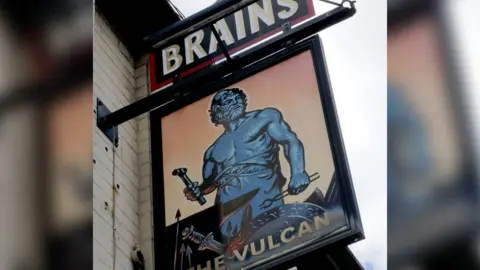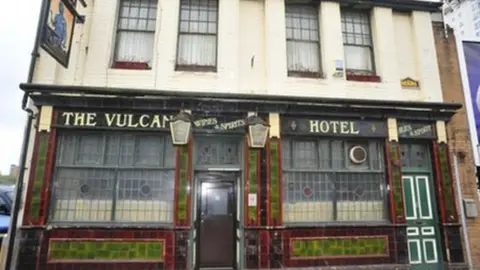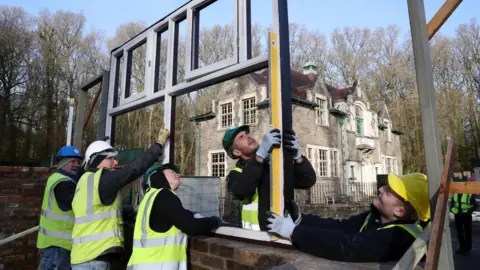The Vulcan: memories and mysteries uncovered as Cardiff pub is rebuilt
 National Museum Wales
National Museum Wales The memories and mysteries of one of Cardiff's oldest pubs are being gathered as it is rebuilt at a museum.
The Vulcan Hotel - named after the Roman god of fire and metal - opened in Adamsdown in 1853.
After decades of being threatened with demolition, it was taken down to be reconstructed just a few miles away at St Fagans National Museum of History.
Museum staff say it seems the Vulcan's reputation as a tough, workingman's pub may not be entirely justified.
Dafydd Wiliam, principal curator of historic buildings at St Fagans, took part in Swansea University's first ever Twitter conference this week - on steel communities - to outline the pub's history.
"The Vulcan was first licensed to sell alcohol in 1853 and served the mainly Irish community of what was then known as Newtown, one of the 'five towns' of Cardiff, along with Crockherbtown, Butetown, Grangetown and Temperance Town," he said.
"In the 1850s its customers were mainly comprised of workers from the rapidly expanding Cardiff Docks rather than steel workers, so we're not yet sure how the Vulcan got its name. We can only presume the original owner must have had some connection with heavy industry."
'Good manners'
Another of the mysteries is why the Vulcan gained a reputation as being a "tough, workingmen's pub", when the evidence seems to suggest that - by the standards of the time at least - it was quite progressive.
"There are some reports in the newspapers of the late 19th and early 20th Centuries of trouble at the Vulcan, and its windows were smashed in 1914, but really no more trouble than you would expect from other inner-city pubs of the time," said Mr Wiliam.
"In fact, it seems good manners were encouraged, with men drinking in an all-standing bar at the front of the pub, and women and couples welcomed into a seated lounge to the rear."
 PA
PAStill, in 1915 ladies escorted each other to the single cubicle in the yard, ladies' toilets still being something of a novelty in pubs.
Meanwhile, the men made do with a neighbouring set of outdoor brown ceramic urinals; one of the original features saved, and due to be incorporated into the rebuild at St Fagans.
Mr Wiliam pointed to the views of Ellen MacCarthy, born in the pub in 1915, who said of the customers: "Well, they were good honest people. They weren't people with big money at all. They were poor really. But they used to like to go and have a drink."
In fact, 1915 was also notable as the year in which the pub's original wooden Victorian facade was replaced with the iconic green and brown tiles bearing its name, and the interior was completely refitted.
 National Museum Wales
National Museum WalesThis is the version of the pub staff at St Fagans are hoping to replicate in the rebuild, re-using what Mr Wiliam said was the "vast majority" of the 1915 fabric.
"A pub like the Vulcan is so many things to so many people - from the thriving years of the coal and steel exporting era, to the community pub until the surrounding homes were demolished in the late '60s, and to the student cult pub it became in the latter part of its existence," he said.
"We had to choose a style, and we decided to set the rebuilt Vulcan in 1915 as that was when its iconic look was established - the one that people remember.
"It will provide an opportunity for us to interpret life within the Newtown community during Cardiff's industrial heyday and the First World War."
Mr Wiliam added that reconstruction work has continued throughout the coronavirus outbreak.
The rebuilt Vulcan is expected to serve its first customers at its new home in 2023.
